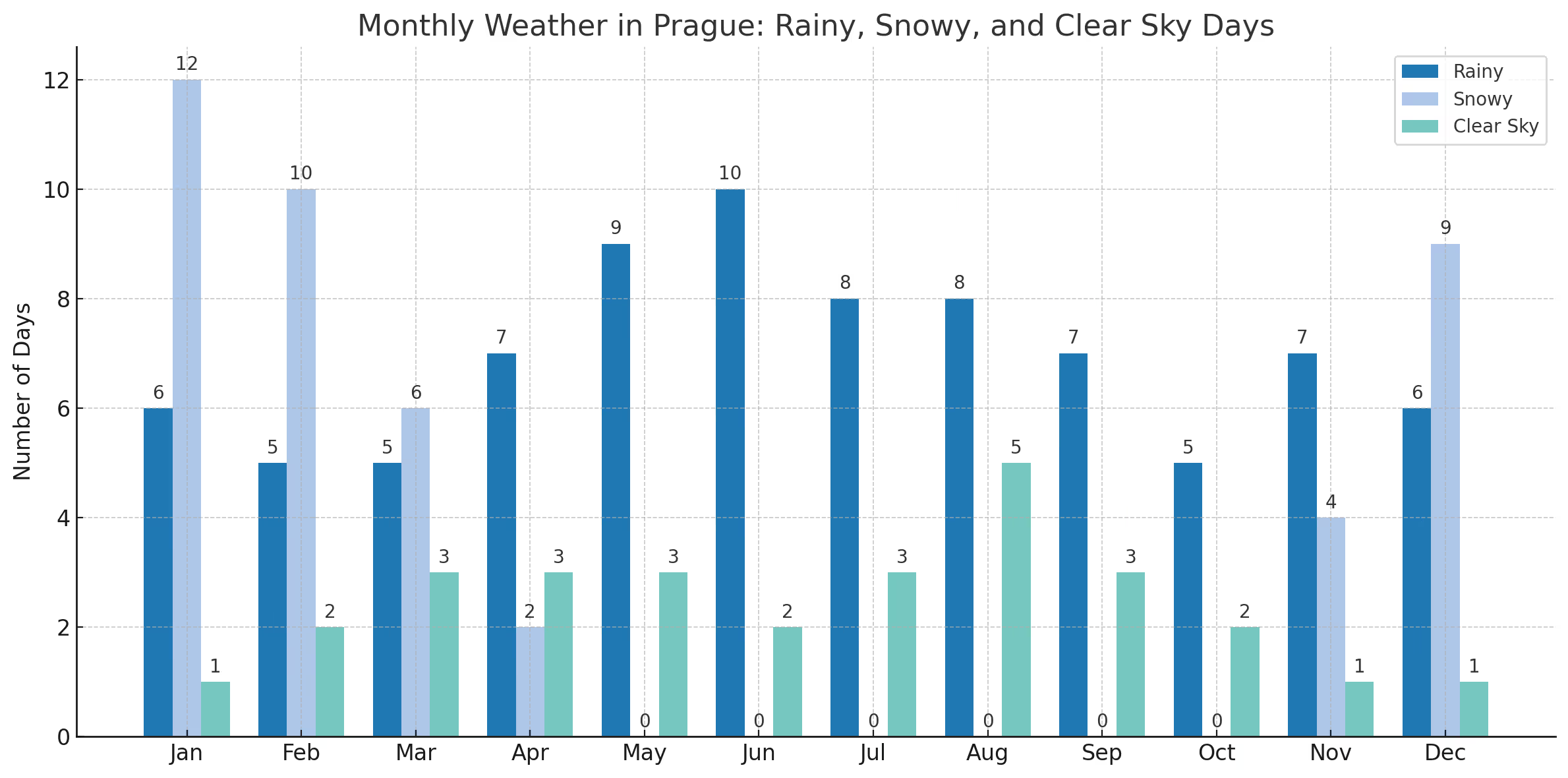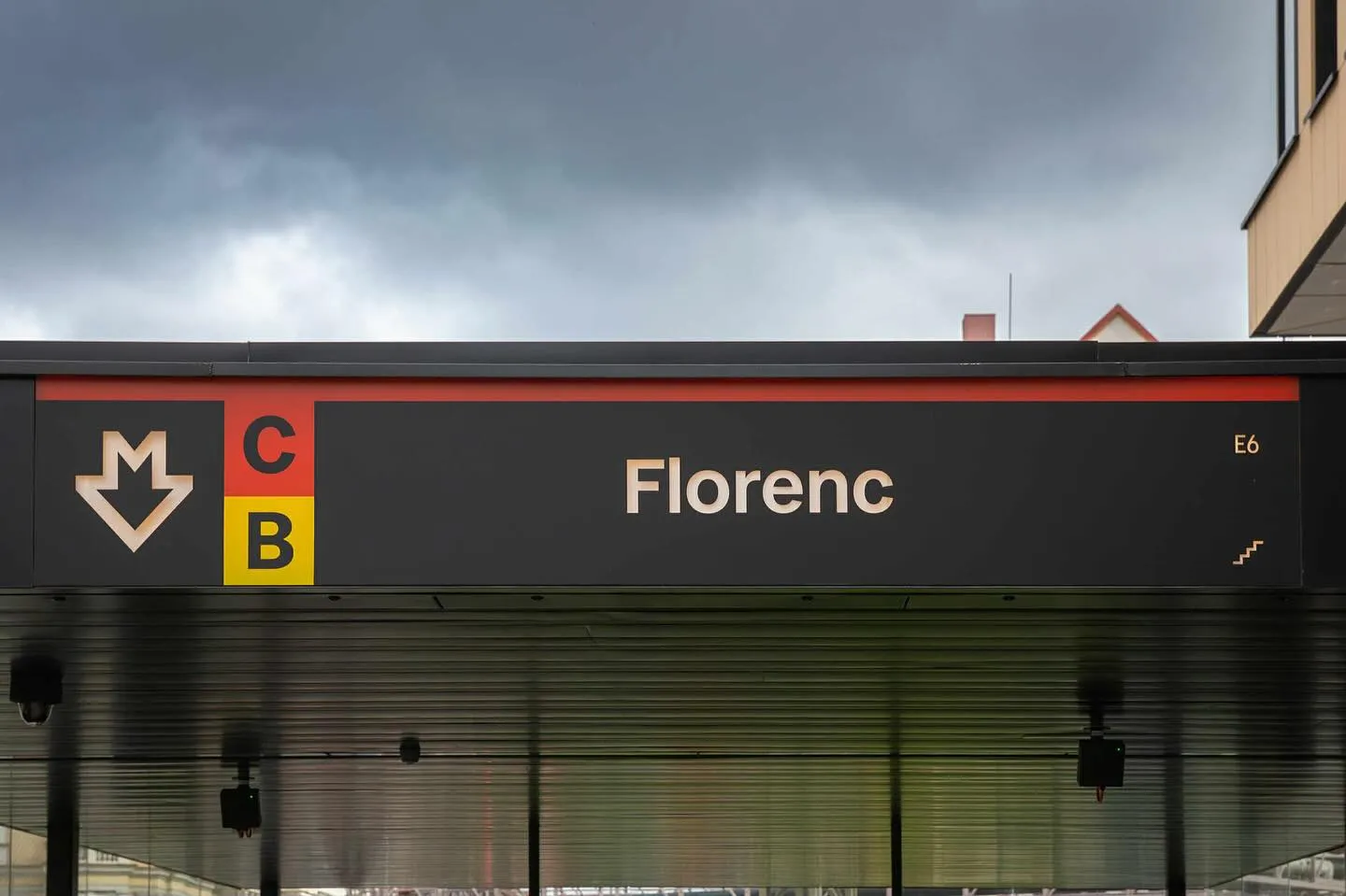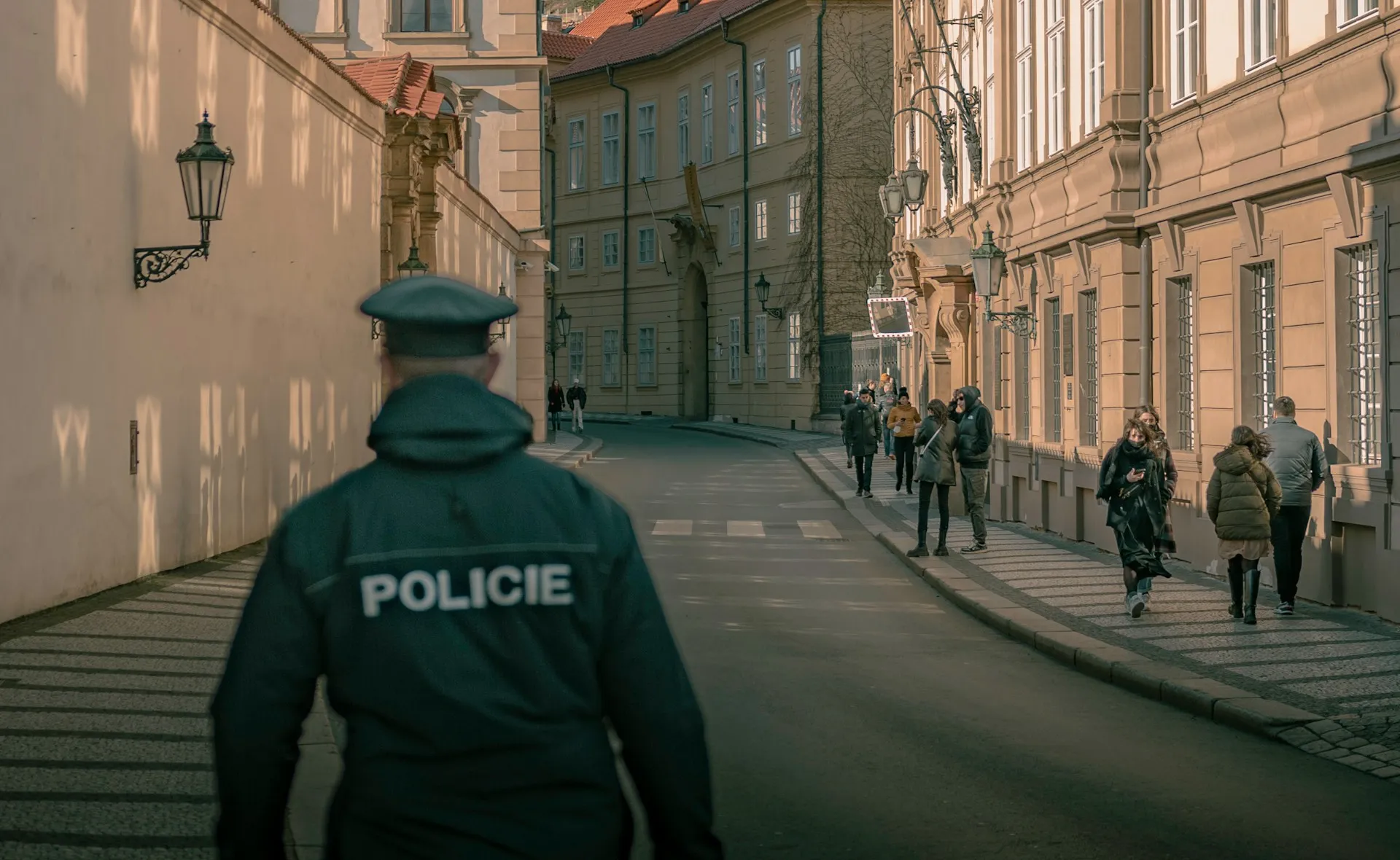During winter, the Czech Republic’s capital city and “the Heart of Europe” shows many faces. If you are lucky enough to find it covered in pure white snow, its romantic charms will dazzle you. But even if the temperatures are above zero, Prague has a lot to offer in December, January, and February.
Since Prague is situated in the temperate latitude of the Earth, the city has a temperate climate with quite chilly winters. At the same time, average precipitation is at its lowest during the winter months, so there is usually not a lot of snow in Prague. When there is a lot of snow, the city looks beautiful under the pure white pillow at first, but snowdrifts melt fast and in some places sometimes turn into a lot of mud.
Weather and Temperatures
The best thing about winter weather, of course, is snow, which makes the whole city romantic. Usually, the snow in Prague only stays for a couple of days, because the temperatures are normally slightly above freezing.

In December, Prague’s temperatures are usually between 2°C (36°F) and -2°C (28°F). The average precipitation is less than 25 mm (1 inch) and can be in the form of snow or light rain. December days are short; it gets dark around 4:30 p. m. Nevertheless, always check the weather forecast before coming to Prague, since the temperatures may vary quite a lot. To mention the most extreme variations, the lowest temperature measured in Prague’s Klementinum weather-station since 1775 was -24,8 °C (12.64°F) in 1853, and the highest was 17.4°C (63.32°F) in 1902.
Concerning the weather, in January it usually gets a bit colder than in December in Prague. The temperatures sometimes even drop to -10°C (14°F), and dusk comes at 4:30 p. m. The lowest temperature on record is from the year 1830 when the Klementinum weather station’s thermometers showed -27,5 °C (-17.5°F). On the contrary, the highest temperature was measured in 1993 at 17,4 °C (63.32°F).
The weather in February is quite similar to January in Prague, with temperatures slowly beginning to rise at the end of the month. You can enjoy more daylight since in February dusk doesn’t come until 5:30 p. m. The lowest temperature of -27,1°C (-16.78°F) was measured in 1929, and the highest of 18,5 °C (65.3°F) in 1990.
Weather Forecast
Average Monthly Temperatures
Average monthly temperatures in Prague during the year are shown in the chart below, both in Celsius and Fahrenheit. The Winter months are December, January, and February.

Average Number of Rainy, Snowy & Clear Days
The amount of snow is, unfortunately, constantly decreasing. Long gone are the white winters with snow on every street that Praguers remember from their childhood. While it still snows quite a bit, temperatures often stay above 0°C, so the snow doesn’t last and quickly melts away.
We recommend checking the weather forecast and planning your trip accordingly if you want to experience Prague covered in snow — a truly unforgettable memory.
The number of rainy, snowy, and clear sky days is presented in the chart below:

A rainy day is defined as having at least 1 mm of rainfall, a snowy day includes any measurable snowfall, and a clear sky day refers to days with no significant cloud cover.
Major Fall Events in Prague
December Events
During the advent, Prague dresses in festive lights, Christmas decorations, and celebratory mood. One can visit numerous Christmas fairs, listen to Christmas carols sung in the streets, or see wonderful displays of the Nativity in Churches.
If you want to experience the very essence of Prague’s Christmas, visit the Old Town Square, where the biggest Christmas tree in the Capital always stands, surrounded by a big Christmas fair rich in variety. Among other things, you can warm up with mulled wine and grog (rum with hot water) there while shopping for hand-made Christmas decorations or enjoying public Christmas carol singing.

Each year on December 5th, Czech people celebrate Saint Nicholas Day. According to tradition, every family with children receives a visit from the trinity of characters – St. Nicholas (Mikulas), the Angel, and the Devil. Kids need to sing a song to them and will receive candy as a reward for good behavior. Bad kids get only a sack of coal or potatoes from the Devil. If you are lucky, you can meet this trinity walking through the city. Some Devils may be really scary and even grown-up people are afraid of them!
To get into the Christmas mood, even more, visit the Bethlehem Chapel on the Bethlehem Square, to see the traditional display of Nativity scenes, usually accompanied by a show presenting items made by woodcarvers and also singing of Christmas carols. It also offers the unique wax Nativity scene: Little Jesus with Maria made from sheep fleece, and Prague’s Nativity scene with Rudolph II and Franz Kafka, as well as such Czech fairytale characters as Křemílek with Vochomůrka and Rumcajs with Cipísek.
Czechs celebrate Christmas Eve on the 24th of December with a traditional dinner of potato salad and fried carp. Make sure to try it at one of the local restaurants. If you’re not a fan of fish, you can also swap the carp for a schnitzel.
January Events
If you can plan your trip to Prague at the juncture of December and January, do so, because this nightlife metropolis is a great place to celebrate New Year’s Eve. Prague’s nightlife is legendary throughout the year, but on the night when December ends and January begins, the Czech Republic’s capital goes almost crazy.

New Year’s Eve in Prague is simply party night. Prague’s restaurants, bars, and clubs are full, and the atmosphere reaches a climax as midnight approaches. As the clock strikes twelve, revelers gather to watch fireworks. You can best enjoy those from somewhere overlooking the Vltava river (for example from Charles Bridge or Prague Castle) or from one of the main squares (Old Town Square or Wenceslas Square). Although in recent years the city has decided not to hold any major fireworks in order to protect animals, there are still many smaller displays you can observe.
Film enthusiasts can enjoy the KOM:PAS Film Festival, which runs from January 8th to 12th in Prague. Previously known as the Festival of Iranian Films, it now features independent films from Central Asia, the Middle East, Africa, and Latin America, bringing a diverse range of voices to local audiences.
Winter carnival season also begins in January, with the Letná Carnival taking place around January 25th. This family-friendly event includes colorful parades, theater performances, and plenty of traditional food stalls, adding a festive flair to the chilly season.
February Events
Prague in February may still be in the grip of winter, but the city stays lively with a variety of events and cultural happenings to keep visitors entertained. One of the biggest highlights is the start of Matějská Pouť (St. Matthew’s Fair), which kicks off on February 22, 2025, at the Výstaviště fairgrounds. This long-standing funfair includes rides, games, food stalls, and family attractions. This year marks the exciting return of the iconic Cyclone roller coaster after a major renovation, adding extra buzz to the fair’s opening.
Classical music remains a staple of Prague’s cultural calendar, with venues like the Rudolfinum and Municipal House featuring orchestras and soloists throughout the month. It’s always a good idea to check their schedules in advance if you’re hoping to attend a performance.
For those of you who are romantic at heart, it is a great idea to celebrate Valentine’s Day in Prague. This popular February holiday is even more romantic when you are enjoying it in the magically beautiful Czech capital, with its castle, luxurious restaurants, and shops selling precious jewelry. Call ahead to the restaurant of your choice to make a reservation and enjoy an amazing candlelit meal with your significant other. Prague is the ideal location for an unforgettable romance.

Finally, outdoor ice skating rinks remain open in February in several spots around the city. There are, for example, ice skating rinks built in various locations in the city during the coldest months of the year, where you can rent skates and enjoy a fun ride on the ice to get your heart pumping. For ice-skating in a charming, almost fairytale-like atmosphere, try out the rink on the Fruit Market (Ovocný trh) in Prague’s Old Town. You can skate here for free until late evening, and the rink also hosts many cultural events.
Snow or No Snow, Prague Shines in Winter
Winter in Prague is a season of contrasts – romantic snowy vistas one day, moody cobblestone streets under a grey sky the next. While snowfall does happen, it’s not guaranteed. On average, December temperatures range between 2°C (36°F) and -2°C (28°F), January tends to be the coldest with occasional drops to -10°C (14°F) or lower, and February begins to warm slightly with daytime highs approaching 5°C (41°F) by the end of the month. Snow typically melts quickly due to temperatures hovering just above freezing, and precipitation remains relatively low – around 25 mm (1 inch) per month.

Despite the chill, winter is a magical time to explore the Czech capital. You might find yourself sipping mulled wine at a Christmas market in December, joining lively New Year’s Eve celebrations in January, or riding the carousel at St. Matthew’s Fair in February. With fewer tourists, cozy cafés, and streets lit by festive decorations or softened by falling snow, Prague in winter offers a quieter, deeply atmospheric experience perfect for those who appreciate history, culture, and a bit of chilly adventure.
5 Honest Tips to Enjoy Winter in Prague
- Layer up:Bring warm, waterproof clothing, including a good coat, gloves, and thermal layers. The weather can be unpredictable, and it’s often windy.
- Check the forecast: Snowfall is sporadic and temperatures vary. Check daily weather updates before heading out.
- Book early for holidays: Events like New Year’s Eve and Valentine’s Day fill up quickly. Reserve restaurants and hotels well in advance.
- Try local winter treats: Don’t miss out on warm Czech dishes like goulash, mulled wine (svařák), and trdelník from market stalls.
- Explore off the beaten path: Winter is perfect for discovering quieter corners of the city like Vyšehrad or the lesser-visited parts of Malá Strana.
FAQs
The most common questions about visiting Prague in Winter.
Yes, but not consistently. Snow can appear in December through February, though it usually doesn’t stay long.
January is typically the coldest month, with temperatures often dipping below freezing.
No, they typically run from late November until early January, closing shortly after New Year’s Day.
Dress warmly with waterproof shoes, a thick coat, scarf, gloves, and a hat. Layers are essential.
Absolutely. If you don't mind lot of tourists, December is a good idea to enjoy the Christmas Holidays.
After the New Year's Eve Prague is less crowded, beautifully lit for the holidays, and offers unique seasonal experiences.
Yes! Most attractions are open year-round, though some gardens or river cruises may be limited.
Many are open, especially in the city center, but smaller businesses may close on December 24–26 and January 1.
Yes, but wear proper footwear. The old cobblestone streets can get slippery, but the city is doing a good job in taking care of the streets during the winter.
Popular spots include the rink at Ovocný trh (Fruit Market), Letná Park, and various seasonal rinks around the city.
Public transport is efficient and runs smoothly even in winter. Trams, metros, and buses operate regularly and are well-heated. Uber is also working pretty well.
Discover Prague’s Must-Sees
Thing to Know
Get ready for your Prague trip by learning and understanding the local basics.

About Prague
Discover everything you need to know about Prague, from its rich history and stunning architecture to essential travel tips for first-time visitors.

Czech Currency
Learn all about the Czech currency, the Koruna, including its history, denominations, and essential tips for using money in the Czech Republic.

City Pass
Get the Prague City Pass to use public transport for free and enjoy entry to over 70 popular tourist sights and galleries. Save money and your time.













